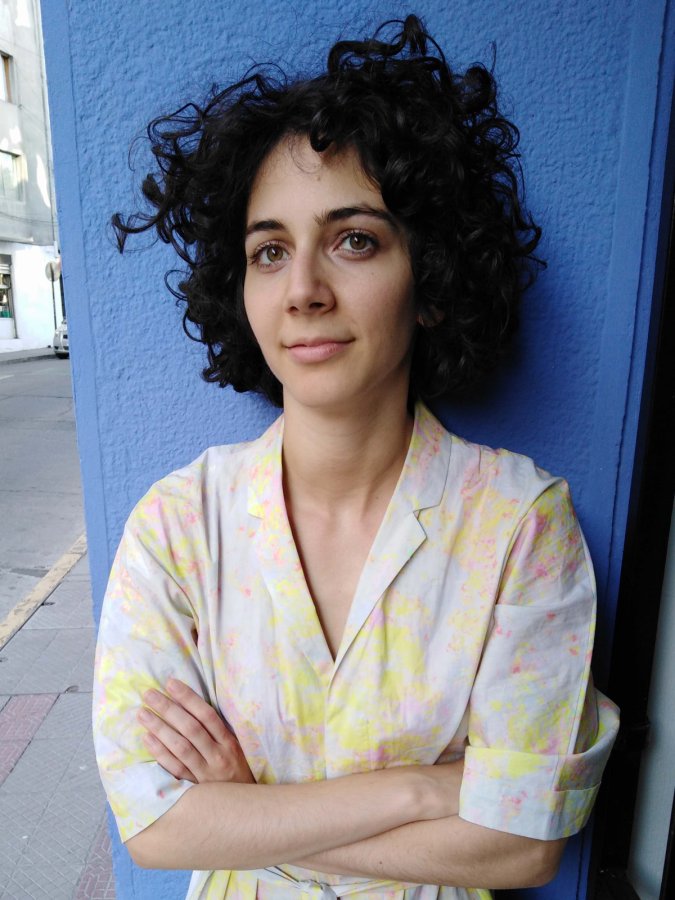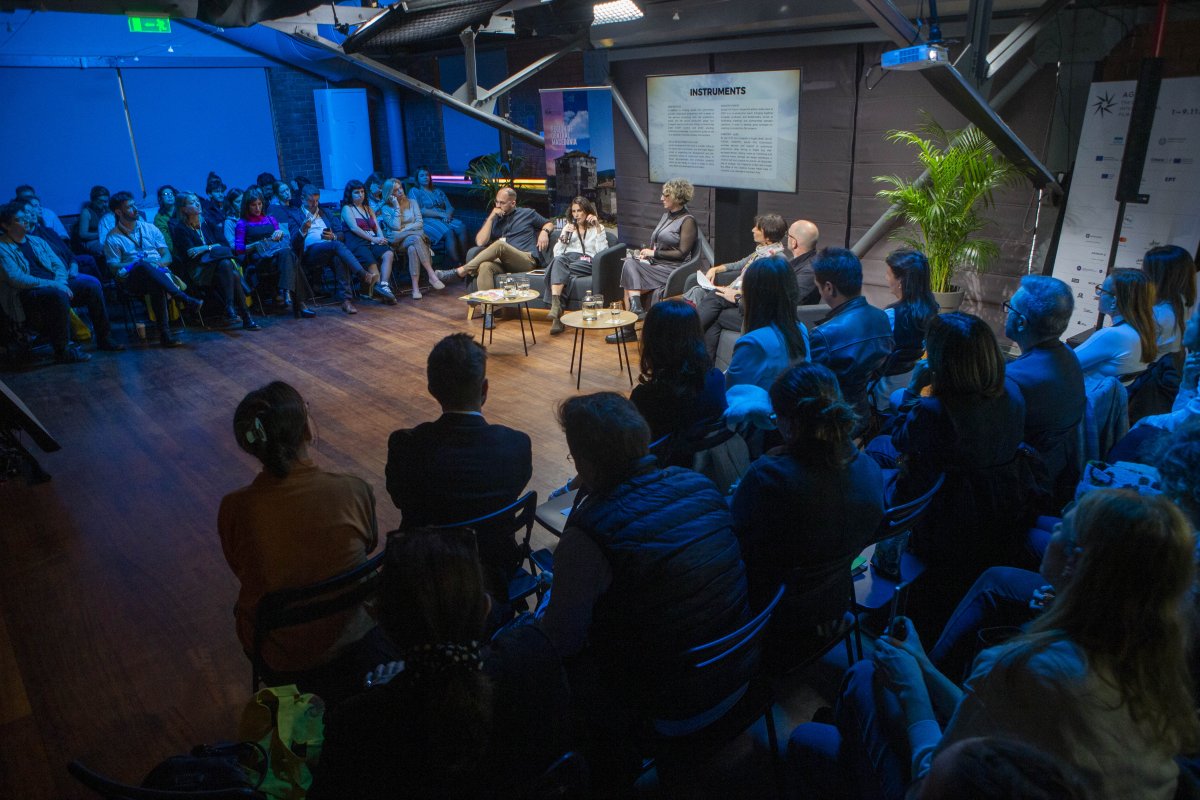Within the framework of the 64th Thessaloniki Film Festival's tribute to Storytelling, screenwriter Panayotis Christopoulos delivered a masterclass on Sunday, November 5th, at Pavlos Zannas theater, titled "More Is More: Building the Narrative World of a Series," where he analyzed the way in which the world and the structure of a series are built.
Panayotis Christopoulos initially welcomed the audience. "Today, I will share with you some of my thoughts regarding how to build the narrative world of a series, as well as the differences between the work we do to structure the plot of a series and that of a film. These thoughts have come about due to my experience in film and series over the last few years and this constitutes a great opportunity to discuss them."
Immediately afterwards, he talked about how scriptwriting is taught in film schools, explaining that in recent years a special course on how to write a series has been included in the academic program, in addition to the courses on scriptwriting for both short, and feature films. "Between the two processes, there are many common elements to be found. However, today we will mainly identify the differences. We'll examine my own series, the approach I used to write and structure it, as well as a couple of others.”
He went on to talk about the differences between a film and a TV script. "Film, as you know, usually starts from a desire; it may be someone looking to acquire something, or escape from somewhere - from a place, from a situation, from themselves, or it may even be someone who desires to get somewhere, as is the case in road movies. There is always a character desiring to prove something, to redeem themselves or to find their purpose in life. That's the way we begin the writing process, by outlining the notorious character arc, which involves the journey the protagonist will embark on and the way it will or won't affect them. At this point, some individual elements start to come in, such as other characters, competing forces, allies, mentors, heroes with their own subplots that either serve as an aid to the main plot or bring about obstacles. Of course, there are exceptions."
Furthermore, he touched upon the fact that cinematic storytelling must apply the "less is more" approach, cutting out anything not absolutely necessary for the story, as there is a risk that the audience will be disoriented, while he also stressed the importance of coherence in a film. Nonetheless, the versions of the story, characters, and subplots removed from the final script constitute something larger than the plot of a film itself; the independent world that the scriptwriter lovingly built. "Many scripts end up having more scenes cut out than those remaining in the script. Sometimes we create supporting characters that we take away from the story completely or partially. The truth is that when such a character departs from the final script, the writer who created him or her experiences a peculiar kind of mourning."
Next, he said that the TV script comes to offer shelter to all those ‘unnecessary’ aspects he needs. "A series is much longer than a movie, so we practically have to fill that time with something, it requires a lot more preparation to write. Another difference that Panayotis Christopoulos emphasized is the episodic nature of a series, as episodes either have a cliffhanger, or a storyline that can stand alone, or a combination of the two. "So, the writer starts writing keeping in mind these differences. At the start of writing a series, as with film, the screenwriter’s main priority is a lot of preparation. Preparation is needed, to study the structure, the characters, and because a TV series takes longer than a movie a lot of material is required. Each character must have his own story. We can have multiple point of views of the narrative. The Fleabag series is an exception, the heroine experiences the whole story through her own perspective."
He specifically referenced the series One August Night, which he created for ERT channel. "It was an extremely difficult project for me, because the series is based on a book, which didn't offer that much material. It was a novella that nowhere near filled the number of episodes the series needed. So, I created some characters that weren't in the book and tried to find a common denominator that would unify the material. A common theme, that is. There is the central story of an imprisoned femicide perpetrator, where staying in prison may not redeem him for what he did, but it does lead him to some awareness. What I attempted to do was to create different kinds of 'prisons' for the other characters in the series, in a metaphorical sense. In this way, a material that seemed heterogeneous acquired a common denominator."
He then referred to the series, I May Destroy You, Sex Education and Mad Men, highlighting once again how the theme of the series serves as a common denominator between the protagonists. Specifically, in I May Destroy You the main characters had to deal with trauma, an element that tied their stories together. "Michaela Cole is the writer, lead actress, and partial director of this particular series on BBC/HBO, while also portraying one of the main characters. The trauma she has to deal with, which I found particularly striking, is that she is the victim of rape, yet she does absolutely nothing once she realizes it because her primary concern is delivering the first draft of her next book. Still, what happened remains an open wound for her." As for the Sex Education series, the messages it conveys are delivered in a very beautiful way. The central message is that nothing is as it seems and reality can turn out to be very different from initial expectations. In other words, the heroes initially construct an entire reality that turns out to be false. "For example, one of the teenage protagonists stages an entire scene in his bedroom to show his mother, an experienced sex therapist, that he takes care of himself sexually, when in reality the opposite is true."
Next, Panayotis Christopoulos spoke about the series Mad Men, one of his personal favorites. "It's a slow-burning series, as the message it aims to convey comes towards its end. It comprises different stories that have a common theme. That is, the actions of one character will affect the actions of another. The common theme is the heroes' ability to adapt to every change occurring in their lives and the resulting consequences. The series attempts to depict the transition from the more conservative 1960s to the more progressive 1970s. In developing its characters, the series touches on issues such as one man's struggle to find his identity, female emancipation, the civil rights movement and many other historical events that occurred in the 1960s. Above all, however, it primarily deals with how the heroes adapt to these changes. Series of such richness and scope are seldom seen in cinema."
When asked by the audience about the extent to which a scriptwriter is also a director, Panayotis Christopoulos answered: "To a very large extent the scriptwriter also works as a director at the same time. To begin with, you are the first viewer of your film or series. But if you're not amongst the lucky ones directing their own work, you're very likely to witness your film take a completely different form than the one you imagined."
















